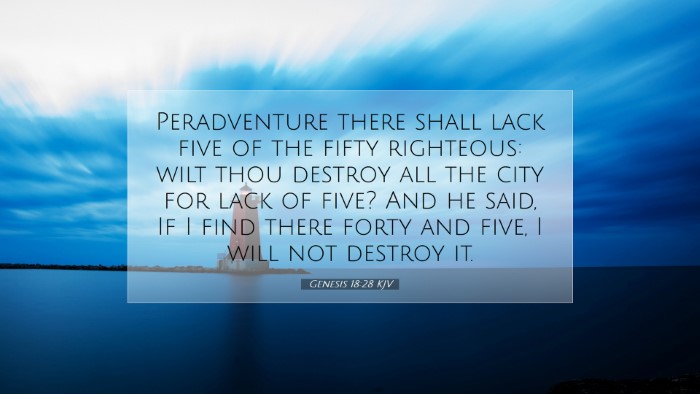Commentary on Genesis 18:28
Verse: “Peradventure there shall lack five of the fifty righteous: wilt thou destroy all the city for lack of five?”
Introduction
Genesis 18:28 captures a pivotal moment in the narrative of Abraham's intercession for Sodom. This verse demonstrates both Abraham's boldness in approaching God and his deep concern for the fate of the city. Scholars and theologians may find rich insights in the commentaries of Matthew Henry, Albert Barnes, and Adam Clarke, which collectively illuminate the themes of justice, mercy, and the nature of prayer in this text.
Contextual Overview
The context of Genesis 18 involves God revealing His plan to Abraham regarding the impending destruction of Sodom and Gomorrah due to their grievous sins. Abraham's plea introduces a profound dialogue about divine justice and mercy as he negotiates for the lives of the righteous within the cities. This verse specifically focuses on the appeal that not all can be deemed unrighteous if some can be found righteous.
Matt Henry's Commentary
Overview: Matthew Henry emphasizes the significance of Abraham's intercession and the character of God as both just and merciful.
-
Divine Justice: Henry points out that God is just and cannot overlook sin. The destruction of Sodom is imminent due to its wickedness.
-
Mercy in Mediation: Abraham's negotiation reflects the possibility of mercy. Henry describes how Abraham’s hope for the salvation of the city by finding a few righteous illustrates God’s willingness to preserve the innocent.
-
Faith and Boldness: Henry highlights the boldness of Abraham’s request. His confidence in God’s character exemplifies deep faith, showing that believers should approach God with earnest and audacious prayer.
Albert Barnes' Notes
Overview: Albert Barnes offers insights into the implications of Abraham's bargain with God and the nature of divine judgment.
-
The Nature of God's Justice: Barnes comments on the principle that God will not destroy the righteous with the wicked. This illustrates the moral order of the universe, where God acts with justice.
-
Prayer and Petition: The verse underlines the power of prayer. Barnes articulates how this account exemplifies the importance of supplication for the needs of others and shows that God's mercy may be available through intercession.
-
Conditional Salvation: Barnes discusses the conditional nature of salvation depicted here—God's response to Abraham's intercession suggests that mercy is often contingent on the presence of righteousness.
Adam Clarke's Commentary
Overview: Adam Clarke provides a detailed analysis of the linguistic and theological implications of the verse.
-
Linguistic Insights: Clarke notes the language used in the original Hebrew and how it reflects a rabbinical style of reasoning. This highlights the cultural context of Abraham negotiating with God.
-
Theological Reflections: Clarke emphasizes that this passage reveals God's willingness to engage in dialogue with His creation. He sees this interaction as indicative of God's relational nature with humanity.
-
Righteousness defined: Clarke discusses the biblical concept of righteousness essential in God’s judgment. He elucidates what constitutes righteousness in the eyes of God, which is key to understanding Abraham’s plea.
Theological Implications
The inquiry Abraham makes in this verse raises significant theological questions concerning the nature of God’s justice versus His mercy. The interplay between these divine attributes reveals key insights into how God relates to humanity.
Justice vs. Mercy
All three commentators agree that God will not act unjustly. The dialogue underscores the belief that while God’s justice is certain, His mercy is equally active in the world. The essence of Abraham's intercession lies in the hope that if few righteous could be found, the entirety of the city could be saved, reinforcing the belief that righteousness is powerful in its capacity to enact divine mercy.
The Nature of Prayer
This verse exemplifies prayer as a serious, engaged, and sometimes bold act. It invites pastors and theologians to reflect on the effectiveness of prayer and intercession, stressing the point that prayer can influence divine decisions and must be grounded in hope and faith.
Conclusion
Genesis 18:28, through the insights of Henry, Barnes, and Clarke, serves as a profound reminder of the power of intercession, the moral fabric of divine justice, and the depth of God’s mercy. For pastors, scholars, and students alike, it challenges the faithful to engage in prayer with boldness, trusting in God’s character while also understanding the seriousness of sin and the preciousness of righteousness.


